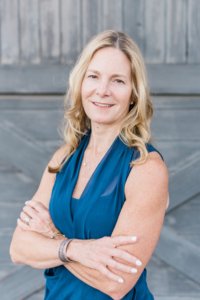Bridget Petrillo, MS, APRN, CRNA, said she first heard about AANA Wellness in 1995, when she was a resident in a nurse anesthesiology educational program. At the time, she said she wasn’t necessarily paying attention to issues around wellness. “The good news is when I needed help, my colleagues and coworkers had been paying attention, and they knew what to do,” she said.
Describing herself as a recovering fentanyl addict, Petrillo said that she became addicted through “a perfect storm of events.” In 1998, she required surgery for an injury and was given prescriptions for opioids afterward.
“Doctors were giving out opioids like candy. The opioid crisis was brewing. I was given a couple of written prescriptions for opioids, and I thought I was Superwoman and that I could go back to work sooner than other people and sooner than my doctors had recommended. I felt that my employer needed me. I had an overinflated sense of self,” she said. “Pretty quickly after my surgery, I got addicted to the pills.”
She said her hospital at the time didn’t have a robust system in place for diversion prevention, and she found ways to divert medications from canceled cases. “My disease quickly escalated. I have a family history of substance use disorder on both sides. I had what I call a trifecta: I had access, which is super important. I had pain, and I had this genetic predisposition. I was physically dependent before I knew what was happening.”
Her coworkers, who were also her close friends, noticed. They alerted her family and other friends to say she needed help. They contacted a state peer advisor through AANA Wellness, and he connected Petrillo with a Certified Registered Nurse Anesthetist (CRNA) who was in recovery from fentanyl addiction.
“He told me what to do, and I didn’t take his advice,” Petrillo said. “I continued to suffer, and my friends and family continued to suffer as well. I thought I could take care of it myself, and we all know self-will is not the treatment plan for substance use disorder.”
Soon after, her family and friends hired a professional interventional psychiatrist, and she went into treatment. “AANA Wellness planted the seed. When I had talked to that person who was a recovering fentanyl addict, he told me what he had been through. The day of my intervention, I remembered talking to him and thinking, ‘Well, he made it through. He’s back to giving anesthesia. I guess there’s hope for me.’ There was that small little inkling of hope that my life wasn’t over. I’m very grateful to AANA Wellness for that.”

AANA Wellness is currently celebrating its 20th anniversary. Its resources and programs have helped countless CRNAs, also known as nurse anesthetists or nurse anesthesiologists, with substance use disorder. Petrillo has been sober since January 27, 1999. She now uses the story of her addiction and journey back to the operating room to educate other CRNAs as well as nurse anesthesiology residents. She’s been involved with AANA Wellness for many years, serving as a State Peer Advisor and on the Peer Assistance Panel. She also is involved with the Anesthetists in Recovery (AIR) group.
The first step toward recovery is getting help – and not being ashamed of needing help, either.
“It’s so hard to get help for ourselves, and our self-worth is so low in the throes of addiction. Getting help seems monumental,” Petrillo said. “For me, that moment of getting in the car, having somebody drive me to treatment, and walking through the door of the treatment center felt like crossing the Grand Canyon 10 times.”
Having dealt with stigma after she came out of treatment, she encourages other CRNAs in recovery to combat stigma around SUD. “We need to stand on our own two feet and continue our sobriety, continue our recovery, continue our treatment, not relapse, and be a good employee. We can share our stories and tell people, ‘I’m in recovery’ – there is no shame in that.”
Her advice to other CRNAs struggling with SUD is that there’s hope, and that help is available.
“You are 100% worth it. I know many CRNAs, nurses, and physicians who have recovered and gone back to work in anesthesia after treatment. You can call the AANA Helpline (800-654-5167) for help 24/7, and a real person will answer that call. It’s confidential.”
She added, “The opposite of addiction is connection. As an alcoholic and an addict, it’s so easy to think, ‘I’m alone, and I’m the only one who feels this way.’ You’re not alone. AANA Wellness has created this network of people helping people.”
To that end, AANA has recently launched the Wellness Ambassador Micro-credential, which is designed for CRNAs/nurse anesthesiologists and residents committed to promoting holistic well-being within their communities and the anesthesia profession. The program equips participants with essential knowledge and skills across several key areas that will help participants emerge as advocates for wellness, equipped to inspire change, foster community support, and promote a culture of empathy and understanding.
“The best way I know how to ensure my continued sobriety is to help another person in recovery, especially a newcomer,” Petrillo said, “and to let them know they can survive and they can thrive.”
If you’re struggling, help is available. AANA offers wellness resources, as well as the confidential, 24/7 AANA Helpline (800-654-5167) that offers live support for alcohol or other drug use. Administrators, colleagues, friends, or family of CRNAs/nurse anesthesiologists or RRNAs may also call the AANA Helpline for concerns and questions related to safely addressing an individual struggling with SUD.